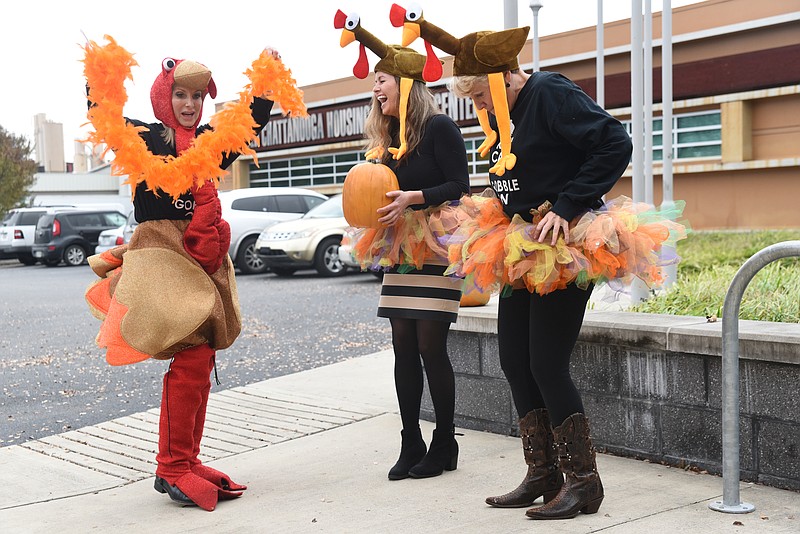Federal officials say the number of Americans and Tennesseans who have experienced homelessness has dropped 11 percent since 2010, and they attribute the decline to President Barack Obama's Opening Doors initiative.
But critics nationally and in Chattanooga question the U.S. and Tennessee figures in the federal Department of Housing and Urban Development's latest Annual Homeless Assessment Report.
The report says some communities are "making significant progress." But it also acknowledges others struggle because of a "crisis" in the lack of affordable housing, budget shortfalls and what officials characterize as "slow adoption of best practices."
Figures are based on HUD's annual "point-in-time" estimates, which attempt to measure the breadth of homelessness on a single night in January. The report includes families staying in homeless shelters and families identified by volunteers who survey streets, parks, all-night businesses and other places where homeless people gather.
HUD says Tennessee communities reported 9,123 persons experienced homelessness, representing an 11 percent decline since 2010 when Obama's "comprehensive strategy" to prevent and end homelessness was launched.
The report also says homelessness among Tennessee military veterans fell by 17 percent between 2014 and January 2015. Family homelessness declined 9 percent and chronic homelessness fell 40 percent between 2010 and January 2015, according to the report.
Nationally, the report says veteran homelessness plummeted 36 percent between 2010 and 2015 while family homelessness dropped 19 percent. Chronic homelessness fell 22 percent.
Chattanooga's 2015 point-in-time count found 635 homeless people. That included 135 children, 24 of them unsheltered, as well as 80 veterans, 17 of them on the street.
HUD Secretary Julian Castro said in a news release the Obama administration has made a "historic commitment to effectively end homelessness" and with partners across the country has "made tremendous progress toward our ambitious goals."
But he conceded "our work is far from finished" and added, "We have to continue making smart investments in the strategies that work so that everyone has a roof over their head."
The count is under fire from three national advocacy groups that charge the single-night national survey "underestimates family and youth homelessness."
First Focus Campaign for Children, the National Association for the Education of Homeless Children and Youth as well as the National Center for Housing and Child Welfare say that when officials make counts, they measure capacity and not needs.
That ignores situations where shelters are often full, many communities have no shelters at all and there are shelters "inappropriate" for families or youths, they say.
In Chattanooga, Maj. Algerome Newsome of the Salvation Army said from what he sees the number of homeless "really hasn't gone down."
"The actual number's going to increase," Newsome added. "The problem with the point-in-count is it kind of misses most of the time because the way they gather those figures is they'll often go into the shelter and talk to people and kind of branch out."
But Newsome said it ignores factors such as a "shifting population," where some homeless people find their way to warmer climes during winter.
Moreover, he said, the count doesn't take into account people who live in cheap, often shoddy housing who are a mishap away from having no affordable place to live.
A case in point, Newsome said, was what happened in East Ridge during September when an estimated 300 families - 1,500 men, women and children who had been living in four structures at Superior Creek Lodge - lost their homes when city officials condemned all four structures.
"I can name at least six hotels like that where you're into the thousands," Newsome said. "We're missing the boat on what I call the emerging homelessness."
Newsome said the Salvation Army opened its cold weather shelter this weekend. It can provide a warm place for about 120 people.
The Salvation Army can no longer provide a standing shelter and "one of the reasons is the community wouldn't support it," the major said.
Officials with several Chattanooga service organizations for the homeless - including the Community Kitchen, Chattanooga Homeless Coalition, Chattanooga Rescue Mission and Chattanooga Home in the Inn - did not return calls Friday.
A Knoxville-based HUD spokesman also did not return calls Friday.
Fifty-four-year-old Martin Collier, who lives in Chattanooga and calls a tent his home, also takes issue with the Tennessee figures.
"What I know is based on actual observation," said Collier, who believes people living in tent communities are being missed. "I know the politicians will lie to make themselves look good."
Contact Andy Sher at asher@timesfreepress.com, 615-255-0550 or follow on twitter at AndySher1.
